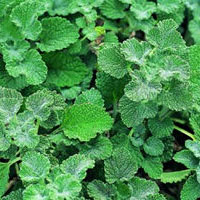Horehound
 © Martin Wall
© Martin WallHow It Works
Horehound contains a number of constituents, including alkaloids, flavonoids, diterpenes (e.g., marrubiin), and trace amount of volatile oils.3 The major active constituent in horehound is marrubiin, which is thought to be responsible for the expectorant (promotion of coughing up of mucus) action of the herb. In addition, marrubiin contributes to the bitter taste of horehound, an action that increases the flow of saliva and gastric juice, thereby stimulating the appetite.4 These actions likely explain the long-standing use of horehound as a cough suppressant and expectorant as well as a bitter digestive tonic.
How to Use It
For adults, the German Commission E monograph recommends approximately 3/4 teaspoon (4.5 grams) of horehound per day or 2–6 tablespoons (30–90 ml) of the pressed juice.5 Alternatively, horehound tea can be prepared from approximately 1/4–1/2 teaspoon (1–2 grams) of root boiled in about 7 ounces (200 ml) of water for ten minutes. Three cups (750 ml) of this tea can be drunk per day. Horehound is sometimes found in herbal lozenges that are used for coughs.
Copyright © 2026 TraceGains, Inc. All rights reserved.
Learn more about TraceGains, the company.
The information presented by TraceGains is for informational purposes only. It is based on scientific studies (human, animal, or in vitro), clinical experience, or traditional usage as cited in each article. The results reported may not necessarily occur in all individuals. Self-treatment is not recommended for life-threatening conditions that require medical treatment under a doctor's care. For many of the conditions discussed, treatment with prescription or over the counter medication is also available. Consult your doctor, practitioner, and/or pharmacist for any health problem and before using any supplements or before making any changes in prescribed medications. Information expires December 2026.
